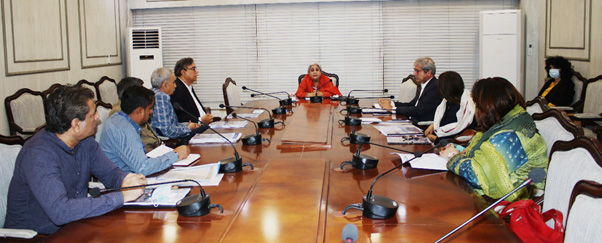NEWS DESK
Pakistan Institute of Living and Learning and the University of Manchester delegation met Health Minister Sindh and key representatives of the Sindh Health Department
On November 18th, 2022, a delegation from the Pakistan Institute of Living and Learning (PILL) and the University of Manchester met with Dr. Azra Fazal Pehchuho, Sindh Minister for Health and Population Welfare, and Dr. Juman Bahoto, Director General, Health Department, Government of Sindh. There was constructive discussion on the Mental Health Policy and Implementation Plan, along with essential strategies to improve access to mental health care in Pakistan. The visiting delegation included Professor Nusrat Husain, Professor of Psychiatry, University of Manchester, Director Research & Innovation, Mersey Care NHS Foundation Trust, Professor Nasim Chaudhry, CEO PILL, Professor Imran Bashir Chaudhry, Professor and Chairman Department of Psychiatry at Ziauddin Hospital and Honorary Professor of Psychiatry, University of Manchester, Prof Moin Ansari, Professor and Chairman, Department of Psychiatry, Liaquat University of Medical and Health Sciences. Professor Zainab Zadeh, COO, PILL, Mr. Ameer Bux, Assistant Director Research Development & Dissemination PILL, Mr. Faisal Aly, Associate Director Digital Remedial, and Bilal Arif, Joint Lead Forensic Mental Health PILL. Dr Kinza Khan, CEO Umang Pakistan were also present during the meeting.
The draft policy has a life course approach and focus on priority disorders. Most serious complication of mental health difficulties is death by suicide. Globally every 40 second one person dies by suicide and marked as a 4th leading cause of death among adolescents.Depression is a leading cause of disability worldwide with 80% disease burden in low and middle-income countries (LMIC). Pakistan has one of the highest rates of depression including postnatal depression and little access to treatment. Trauma and adverse childhood experiences have a strong association with mental health difficulties. Climate change is having a major impact on Pakistan and called as “Invisible injustice”. Recently around 33 million people, including approximately 16 million children, have been affected by this year’s heavy monsoon rains in Pakistan. This has led to a critical mental health crisis. Responding to this massive mental health challenge. Dr. Azra Pehchuho, health minister province of Sindh has taken the initiative to establish “Improving Access to Psychological Therapies (IAPT-PK), initially in the two districts of Sindh Dadu and Qambar Shahdadkot. During the meeting the Minister talked about incorporating telehealth to scale up mental health intervention particularly to serve remote areas. “Considering the lack of access to appropriate psychological support especially in remote areas, we must prioritise the implementation of telehealth within the provision of mental health care in Pakistan”. Learning from Grand Challenges Canada funded Learning Through Play Plus (R-TTS-2106-39652) a parenting intervention was considered a top priority to promote early child development and parental mental health. There was also discussion on severe mental illness so that no one is left behind. Professor Imran Chaudhry remarked, “A key step for the rehabilitation of people suffering from severe mental disorders such as Psychosis and Bipolar Disorder are psychological interventions. He talked about the Canadian Institute of Health Research (CIHR) funded Culturally Adapted Psychoeducation program (460586) for bipolar disorder (CaPE), which is the cultural adaptation of the psychoeducation program and another CIHR funded Culturally adapted Cognitive Behavior Therapy and Family Interventions for Psychosis. Prof Chaudhry briefed the health minister about setting up Remedial Early Identification and Detection (READ) service for early detection and prevention of severe mental illness. Professor Nasim Chaudhry mentioned about world leading rehabilitation work and gave the example of the burden of disease from burns injuries. “Every 9 out of 10 burn injuries and deaths occur in LMICs such as Pakistan. She talked about NIHR funded (NIHR203082) Burns Rehabilitation program to develop a culturally adapted multidisciplinary rehabilitation programme for burn injuries in Pakistan. Speaking on injuries Professor Zainab Zadeh provided a detailed insight into the MRC/DFID/NIHR funded world’s largest therapist delivered trial to reduce the rate of self-harm and suicide prevention in adults (CMAP MR/N006062/1) and adolescence (YCMAP MR/ R022461/1).
Pakistan is one of the youngest countries in the world i.e. 64 percent is below the age of 30. Professor Husain said, “The youth is our future, and it is incredibly important that we employ resources to prevent lifelong disabilities. He also mentioned potential support from Mersey Care NHS Foundation trust to improve outcomes in young people. Including, trainings in self-harm prevention. He talked about a school based suicide prevention program (SEPAK) which has recently been piloted in Pakistan will play an instrumental role in spreading awareness and improving Mental health amongst young students in educational institutions.
To strengthen the means of implementation and revitalize the global partnership for sustainable development. Professor Husain highlighted the extensive research network which PILL has established in collaboration with University of Manchester and discussed projects being developed with key collaborators across the UK, Canada, Pakistan, Bangladesh, Afghanistan, India, Kenya and Nigeria and shared the message from Prof. Nigel Hooper, Associate Vice-President for Research at University of Manchester, who is pleased to extend his support particularly in multimorbidity and digital mental health research. Prof. Joe Rafferty, CEO Mersey Care NHS foundation Trust, one of the largest Trusts providing physical and mental health services in the UK and the largest provider of telehealth services in Europe has also expressed his full support particularly in improving telehealth services, population health, and research and training in self-harm and suicide prevention. Prof Husain acknowledged the support from Prof David Clark,(C.B.E.),who has established world leading IAPT services in the UK to help setup IAPT PK. The Honourable Minister expressed a strong interest to work collaboratively with PILL, University of Manchester and Mercy Care NHS Foundation Trust to develop Sindh’s first provincial mental health policy and implementation plan. Professor Husain commented “we are hopeful that our international partners will add value towards our goal to promote primary and community healthcare and wellbeing, in Pakistan”. Concluding the meeting HonourableHealth Minister, Dr. Azra Fazal Pehchuho and DG Health Services, Dr. Juman Bahoto have decided to hold regular meetings with PILL and University of Manchester representatives to implement IAPT-PK and finalize the Mental Health Policy to eliminate barriers to adequate mental health service delivery across the Sindh province and promote wellbeing for all, ensuring that no one is left behind.
















